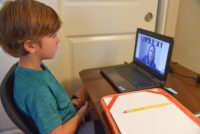By focusing on key pillars such as access, critical thinking, collaboration and community engagement, the Kingdom is preparing future leaders with the skills necessary to thrive in a globalised and digital world, says Dr Sumaya Alyusuf, Development and Recognition Associate Manager at the International Baccalaureate (IB)
As Saudi Vision 2030 paves the future for a vibrant society and thriving economy, education plays a crucial role in realising this future. Leaders across the Kingdom are poised to shape social reforms initiated by the vision, from empowering women and engaging youth to enhancing the country’s global competitiveness.
Creating leaders who can steer that vision starts in the classroom. Young learners need to acquire future-ready skills that will enable them to thrive in higher education, careers and beyond. Cultivating competencies such as critical thinking and problem solving from the start of their education will prepare them to flourish in an increasingly globalised and digital world.
Through their everyday decision-making, educational leaders in Saudi have the power to impact the future of education for the better and build a stronger education system for our students. By focusing on these key pillars – access, critical thinking, communication, community engagement and collaboration – educational leaders in Saudi can prepare students for the challenges of today and lay the foundation for a more prosperous, inclusive and globally competitive future.
Increase access
Better access to education is a major part of Vision 2030. Compared to other nations within the Organisation of Economic Cooperation and Development (OECD), school enrolment rates remain reportedly low. The enrolment rates of 6-14-, 15-19- and 20–24-year-olds in Saudi Arabia are one of the lowest among OECD and partner countries.
Educators need to create pathways to learning for all. Building future-ready skills involves increasing enrolment and education more equitably for all young learners. In response to a call for future-ready education, leaders are actively building pathways to learning for more young people across the Kingdom.
To supplement these efforts, Saudi included the UN’s Sustainable Development Goals (SDGs) on its priority list and consequently launched the Human Capability Development Programme to enhance educational opportunities nationwide. This initiative includes expanding educational reach within the Kingdom to students in rural communities and enhancing family involvement in children’s future readiness.
Instil critical thinking
Building global competencies and critical thinking skills early in young learners is key to supporting the actualisation of the Saudi Vision 2030’s goal of ‘A Thriving Economy’. These skills allow students to contribute meaningfully to the country’s economic diversification, especially in digital transformation and Artificial Intelligence, which constitute a large portion of the goals set forth for Vision 2030. Young learners must hone their ability to think critically and learn to ask meaningful questions in order to fully thrive.
To gain a competitive edge in tomorrow’s economy, students need skills but also competencies, such as curiosity and open-mindedness, which serve them in higher education and their careers. Challenging young learners to imagine alternative pathways to economic prosperity beyond oil, to ask how AI can contribute, and to engage with a digital future requires imbuing students with future-ready skills as early as possible.
Foster communication across cultures
To fulfil the goal of creating a ‘Vibrant Society’, students must develop effective communication skills and multi-cultural understanding to become leaders in an increasingly interconnected and complex world. A vibrant society is one where students value their heritage, traditions and customs and also embrace the skills required to excel in a globalised world.
As they engage with other cultures and learn other languages, young people should embody pride in their identity and empathy for global communities. Intercultural understanding is vital to building the foundations for peace and prosperity, both within the Middle East and beyond.
Connect with communities
To create ‘An Ambitious Nation’, educators need to give students the chance to engage with their communities early through outreach opportunities. When today’s young learners engage with and understand the needs of their communities, they can better develop solutions as they take on professional careers and grow into leadership roles.
This includes incorporating sustainability education to achieve Saudi’s goals of food security and effective water management, vital to ensuring communities are supported to build prosperity.
Collaborate more widely
Saudi Arabia’s educational transformation will require ongoing collaboration and innovation from leaders within the education sector. In September the Education Experts Annual Conference in Riyadh brought together global educational leaders to discuss the future of education and pathways needed to prepare students for tomorrow’s challenges.
The decision to host several global events and conferences on education throughout Saudi Arabia in the coming year underscores the nation’s commitment to preparing for the future of education.
Through knowledge sharing and the continued cultivation of strategic partnerships, Saudi Arabia is well positioned to achieve its ambitious educational goals and the Vision 2030 objectives. The country’s commitment to empowering today’s learners and nurturing their growth as tomorrow’s leaders will be instrumental in turning Vision 2030 into a reality.








